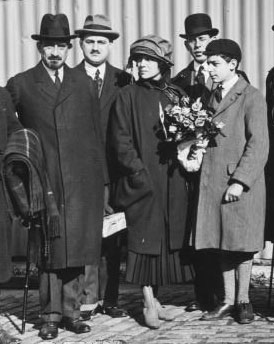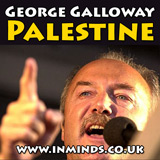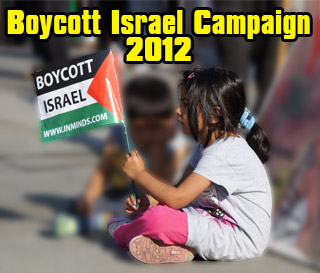
 Innovative Minds © 2014. All Rights Reserved. www.inminds.co.uk | ||||
|
Comment: Nice piece exposing the historic links between M&S and zionism. Read it and then Boycott Marks and Spencers. Marks and Spencer: ally of IsraelTrevor Rayne The history of Britain's biggest clothing retailer Marks and Spencer demonstrates how consumer habits in Britain are tied to the oppression of other peoples. Marks and Spencer has championed the state of Israel and thus connived in the dispossession and suppression of the Palestinians. Our comforts and pleasures, which Marks and Spencer so eagerly service, have been bought at an unacceptable price.
Zionism became the lietmotif of their lives, and they brought it qualities of which we stood greatly in need.
Chaim Weizmann, Israel's first president talking about Simon Marks and Israel Sieff - the chair and president of M&S. Russian Tsar Alexander II was assassinated in 1881. Pogroms against the Russian Jews followed. Many Jewish people fled to the USA, some came to Britain and a trickle went to Palestine â a land they called Zion. Among those coming to Britain was Michael Marks, who was settled in Leeds by 1884. Between 1870-1900 real incomes per head in Britain rose by up to 70%. As factory production of consumer goods increased so pedlars, fairs and markets gave way to fixed shops. By 1875 department stores catered for the middle classes. In the last twenty years of the nineteenth century the number of branches of multiple retail firms increased seven fold and some in the working class began to imitate middle class shopping habits. Michael Marks' early career reflected these changes as he went from being a pedlar to a chain store owner. By 1903 the firm had 40 branches and moved its headquarters to Manchester. Tom Spencer had joined Marks in 1894 and Marks and Spencer dates from 28 September 1894. A dynasty is foundedFrom its foundation until today Marks and Spencer has retained the founding families and their heirs on its directorial board. Michael and Hannah Marks' daughter Rebecca married Israel Sieff in 1910; her brother Simon married Israel's sister Miriam in 1915. Israel was to become the first Lord Sieff, chair and president of the company. Another Marks' daughter, Miriam, married Manchester Guardian journalist Harry Sacher. Sacher became a director and historian of the company and also worked as a barrister in Palestine. Another daughter, Elaine, married Norman Laski, who later became a director. Together in their Zionist activities they became known as 'The Family'.  M&S chairman & president Israel Sieff (2nd from left) with future Israeli President Chaim Weizmann (left) and his family in Plymouth, March 1921. Hovevi Zion (Love of Zion) was founded among Russian Jews in 1882. It wanted Jewish people to go to Palestine and establish a homeland there. Early Russian Jewish agricultural settlements in Palestine depended on Baron Edmond de Rothschilds' money and Arab labour. The First Zionist Congress was held in Basel, Switzerland in 1897. Theodor Herzel, an early Zionist leader, explained, 'For Europe we shall create there in Palestine an outpost against Asia, we shall be the vanguard of the civilised world against barbarism.' Originally, the British government proposed that a Jewish homeland be established in Uganda â a suggestion later echoed by Nazi plans for settling Jews in Madagascar or Siberia. However, British imperialism warmed to the idea of supplanting the Ottoman Empire in the Middle East and to that end Zionism soon found supporters among the British ruling class. Britain encouraged Zionism in Palestine during the early part of the First World War to encourage US Jews to ally the USA with Britain against the Turkish Ottomans. With the 2 November 1917 Balfour Declaration the British government announced its intention to establish a Jewish National Home in Palestine. In 1920 Palestine became a British mandated territory and the Balfour Declaration was incorporated in that mandate. Prime Minister Balfour said, 'in Palestine we do not propose even to go through the form of consulting the wishes of the present inhabitants of the country... (Zionism was) of far profounder import than the desire and prejudices of the 700,000 Arabs who now inhabit that ancient land.' The British Labour Party and Trade Union Congress swiftly endorsed the Balfour Declaration.
After the Second World War, Marcus Sieff heeded the call of David Ben Gurion, Israel's first prime minister upon the foundation of Israel in 1948, to defend the new state. Marks and Spencer and Marcus Sieff provided organisational and material support to Israel in this period. Marcus Sieff returned to Britain in 1951 and took over the expanding food department. Marks and Spencer supported Israeli agriculture and manufacture with both supplies and imports. Marcus Sieff was made director of Marks and Spencer in 1972 and served on the board until his death earlier this year. His son, Sir David, is currently a director.
Chaim Weizmann was to become leader of Zionism and in 1949 Israel's first president. Weizmann was a reader in biochemistry at Manchester University. During the First World War Weizmann worked for the British military extracting acetone from maize for use in cordite, an explosive. Weizmann used this contribution to the war effort to advance the Zionist cause. He had supporters in CP Scott editor of the Manchester Guardian, the journalist Herbert Sidebotham, Simon Marks, Israel Sieff and Harry Sacher. Marks and Sieff had become convinced Zionists around 1913. Weizmann wrote, 'Zionism became the lietmotif of their lives, and they brought it qualities of which we stood greatly in need.' Between 1917-20 Sieff accompanied Weizmann abroad with the British Palestine Commission. Simon Marks was seconded by the British army to direct Weizmann's London headquarters. Marks recalled, 'One day I was a signaller. The next day I was plunged into the mysteries of diplomacy and found myself representing Weizmann on equal terms as generals and admirals.' In 1918 Weizmann enlisted the support of Emir Faisal, later the King of Iraq, for a Zionist state. A super-storeAs Marks and Spencer grew so it was better placed to support the Zionist movement. 1922 was a bad year for Germany as the German mark collapsed but a good year for Marks and Spencer. Goods bought in Germany for a few pounds were sold in Britain for thousands. Marks and Spencer's profits for 1922 were five times those of 1921. In 1924 the company's head office moved from Manchester to Chiswell Street, London. Marks and Spencer became a public company in 1926 with the Prudential Assurance Company investing heavily in the business and appointing two directors. From this time on and until today the fusion of Prudential's finance with Marks and Spencer was destined to create a super-store. The number of Marks and Spencer's shops grew from 126 in 1927 to 234 in 1939 â continuing to open stores throughout the Great Depression â and establishing a close relationship with the building company Bovis.
Marks and Spencer's directors include the chair of the British-Israeli Chamber of Commerce and the governor of the Weizmann Institute of Science. Marks and Spencer sell approximately £240 million worth of Israeli goods each year. The Israeli ambassador to the Court of Saint James recently honoured Marks and Spencer for its support of Israel. This support has been unstinting.
The Marble Arch Marks and Spencer opened in 1930 and the Pantheon, further along Oxford Street, in 1938. 'Customers were intended to come there to enjoy themselves and not merely discharge a harassing and tiring chore; it tried to do for the mass of the people what the great department stores had done for the middle classes.' (Goronwy Rees, St Michael: A history of Marks and Spencer). Sales of dress material gave way to sales of dresses and stockings as artificial fibres and the mass production of women's clothes developed between the world wars. Food retailing was introduced with canned fruit and oranges produced by settlers in Palestine. Marks and Spencer registered St Michael in 1928 as the trademark for goods produced to its orders. The archangel Michael is the patron and guardian angel of the Jewish people. In the Book of Daniel, Michael is described as the special protector of Israel. Saint Michael is also the patron saint of battle, of security forces and paratroopers, of banking, of the sick and those possessed by the devil. Saint Michael is also the Archangel of Death. 'Making the desert bloom'In 1918 Jews formed less than 10% of Palestine's population. By 1929 the Jewish population had nearly trebled to 156,000. They had 4% of the land but 14% of the cultivable land. In 1939 there were approximately half a million Jewish people in Palestine. Zionist settlers expelled Arab peasants from the land. Zionism opposed co-operation with the Arabs; Jews were to be separate and superior. Despite Arab riots in Jerusalem in 1929 the British Labour Prime Minister MacDonald encouraged increased Zionist settlement. Weizmann remarked that Labour 'in their pro-Zionist enthusiasm, went far beyond our intentions' in throwing Palestinian Arabs off the land. Between 1936-39 Arabs rebelled against British rule in Palestine: over 5,000 Arabs were killed and 14,000 wounded as British forces put the revolt down. Weizmann and his fellow Zionists had opened the Hebrew University in Rehovoth in 1926. In 1933 when Hitler became Chancellor in Germany, Weizmann wanted to provide a refuge for Jewish scientists forced out of Germany and apply science to the problems of a Jewish agricultural economy in Palestine. That year Israel and Rebecca Sieff, together with Weizmann, opened the Daniel Sieff Research Institute in Rehovoth (named after the Sieffs' recently deceased son). During the Second World War the Sieff Research Institute provided the Allied forces with pharmaceuticals and help in producing synthetic rubber. When Weizmann became Israel's president the Sieff Research Institute became part of the Weizmann Institute. Marks and Spencer's directors wanted their firm to become a model for Zionist and Israeli commerce. As Arabs were killed and driven from their land so Zionist scientists worked to 'make the desert bloom'. Marcus Sieff, later Lord Sieff of Brimpton, brother of Daniel, first visited Palestine in 1939 at the age of 16. After the Second World War, Marcus Sieff heeded the call of David Ben Gurion, Israel's first prime minister upon the foundation of Israel in 1948, to defend the new state. Marks and Spencer and Marcus Sieff provided organisational and material support to Israel in this period. Marcus Sieff returned to Britain in 1951 and took over the expanding food department. Food sales grew from 14% of total sales in 1956 to over a quarter in 1968. Marks and Spencer supported Israeli agriculture and manufacture with both supplies and imports. Marcus Sieff became chancellor of the Weizmann Institute of Science. In 1974 Labour Foreign Secretary James Callaghan asked Sieff to become British ambassador to Israel but Sieff declined. He was made director of Marks and Spencer in 1972 and served on the board until his death earlier this year. His son, Sir David, is currently a director. The threat of global brandsMarks and Spencer suffered an over 50% drop in profits in 1999 as the threat from global brands and stores like Matalan, Next, Tesco and Gap bit into sales. Nevertheless, the Financial Times year 2000 rankings still had Marks and Spencer as the 36th biggest British firm if measured by market capitalisation value. The company was worth about £9 billion and employed 51,306 people. As befits such a fortune, the directorship now represents a cross-section of British finance capital. Current and recent directors include the chairs of the Prudential, Centrica, Rolls Royce, Cable and Wireless, the Defence Industries Council, the deputy chair of Bass, directors of Schroders, Standard Chartered Bank, Philips, Cornhill Insurance, Rio Tinto and the Canary Wharf Group. Also on board is Dame Stella Rimington, former head of MI5 â no doubt appointed for her dress sense. Marks and Spencer's directors include the chair of the British-Israeli Chamber of Commerce and the governor of the Weizmann Institute of Science. According to Greenribbon and the Jewish Chronicle, Marks and Spencer sell approximately £240 million worth of Israeli goods each year. The Israeli ambassador to the Court of Saint James recently honoured Marks and Spencer for its support of Israel. This support has been unstinting. Marks and Spencer has long been regarded as one of the better employers in Britain. Most of its produce was British made (99%, they used to boast) and the firm had a reputation for quality. Marks and Spencer served as a model of British commercial success, a shop that people would visit from Paris, New York, the former British colonies or wherever, whenever they were in London. Many shopping centres and high streets were propped up by the continuing presence of Marks and Spencer. The shoppers never saw the diabolical plot their search for value for money became part of. Good intentions, carefully packaged far away like Israel itself, built another tragedy in the Middle East.
Source: http://www.revolutionarycommunistgroup.com/frfi/160/160m_s.htm Also Of InterestPage URL: http://inminds.co.uk/article.php?id=10217
|
|
Support Us
If you agree with our work then please support us.Campaigns INMINDS Facebook Live Feed Latest Video's
INMINDS Twitter Feed Tweets by @InmindsComFeatured Video's
You need Flash player 8+ and JavaScript enabled to view this video.
[all videos (over 200)..] Featured MP3 Podcast  During the holy month of Ramadan, as we move towards the Eid, I was going around Muslim shops in Tower Hamlets and elsewhere telling them that although they had collection boxes for the Mosque, although they had religious imagery in their shops, although they were selling dates to the faithful people to break their fast - the dates were made in Israel! They were stained with the blood of the Palestinian people! And Muslim shop keepers were selling them! Respect MP for Tower Hamlets Respect Youth Tower Hamlets, Feb 2008 [21min / 11Mb] [all podcasts..] Newsletter Feedback |
 |
 |
















































